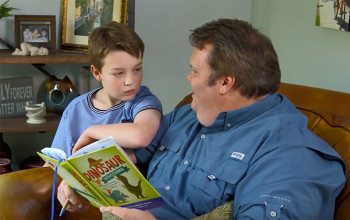
The War of Words
In this Adventures in Odyssey drama, a carelessly uttered word from Eugene creates havoc as it becomes the fashionable insult, resulting in a lesson about the power of words.
Home » Episodes » Focus on the Family Broadcast » Boone and Me: A Foster Adoption Story
Excerpt:
Cecil Stokes: “And after hours of grilling and good cop-bad cop social workers, the good cop stood up and said, you know, “We’re gonna give this a try.” She said, “No one has ever fought for this child in his entire life, and you’re fighting for him without ever even meeting him.”
End of Excerpt
John Fuller: Cecil Stokes is our guest today on Focus on the Family, and he’s joined by his son, Boone Stokes. Your host is Focus president and author Jim Daly. I’m John Fuller.
Jim Daly: Hey, John, well, I am so excited about the story we’re going to share today. It’s a story of hope, resilience, redemption. And a reminder, if you don’t know, November is National Adoption Awareness Month.
So we’re sitting down with a single dad and his son Boone, who was adopted from foster care. And again, their story – it’s going to melt your heart. As you’re listening, to give you some context to the conversation today, um, pray for those kids who are in foster care. Right now the number’s at about 440,000 children that are in the system. And again, there’s more if you add Canada to that as well. And they are desperate to find a good foster home to be in while their birth parents work out issues. Or it might be that the state has terminated parental rights and they’re actually waiting for an adoptive home. And it’s one of the things that we do here at Focus on the Family through our Wait No More program. We’ll talk about that a little later. But pray specifically for these children and for the adults that need to be prompted, particularly in the church, to do something.
John: Yeah, and I think, Jim, as we’ve talked about here in the broadcast, if you’ll just go to God and ask him, “What’s my part,” he’ll show you some starting steps to get involved in caring for the fatherless. Um, so Cecil and Boone live in the Charlotte, N.C., area. Cecil is a TV and film producer. And his son Boone likes sharks, dinosaurs, Legos and reading. And we are so glad to have them both here.
Boone Stokes: Yes.
Jim: It’s great to have you here.
Cecil: Thank you.
Jim: It’s fun. Cecil, let’s start with you. When you turned 40, just for the listeners to get some context here, you’re living what some might think is a dream life, walking the red carpet, a successful TV producer. How many TV shows have you produced?
Cecil: Five hundred and thirteen.
Jim: (Laughter) That is a lot of work.
(LAUGHTER)
Jim: But you had one unfulfilled dream. And tell us what that dream was.
Cecil: I’ve always – since I was 12 years old, I wanted to be a parent. I wanted to be a husband. And it didn’t happen in a traditional way.
Jim: Yeah, and you wanted to be that dad, specifically.
Cecil: I did. I wanted a son. And when I was in college, I remember God telling me I would have a son. And so I knew he was coming, but I didn’t know when…
Jim: That’s pretty specific. That’s amazing.
Cecil: …It was beautiful.
Jim: Now, you were in and out of relationships. Again, painting that picture for the listener, what were your 20s and 30s like?
Cecil: Well, there were very few relationships because I wanted a godly, nurturing wife. And I wanted a woman who wanted also to adopt because I had known pretty much my whole life I wanted to adopt, um, instead of having a biological child. So that narrows down the dating pool. So the relationships that I had were great relationships but none of them became fruitful.
Jim: I have to ask you, though, I mean, did that have to – had you thought about just having children? I mean, if you got married that would be natural, you could do both, right? You can have biological children, as well as adopting…
Cecil: I think there was something planted in my heart…
Jim: …Is that right?
Cecil: …That just told me there are a lot of kids in the world that need parents, and you’re going to be a good parent and you need to be together.
Jim: When we look at that statistic, you know, most people are blown away because they have no idea, about a quarter of that 440,000 number are available for adoption, so over 100,000 children within the foster system where parental rights have been terminated. There’s something like 350,000, 360,000 churches. I mean, we’re talking about one child every third church.
Cecil: That’s correct.
Jim: If three churches could adopt one child, we would have that need taken care of. How does that speak to your heart, given what God laid on you?
Cecil: That’s one of the reasons that we’re thankful to be here today, is it’s a very solvable challenge. And it’s a biblical call to every single person that we’re supposed to take care of the widows and the orphans in distress. And God plants the lonely in families. There’re so many verses in the Bible that sets us up that we don’t realize this is speaking to me. And it’s amazing.
Jim: Boone, I’m going to turn to you. And foster care can be really rough. I was in it. My mom died when I was 9. My dad wasn’t in our story at that point. He divorced my mom. But I was in foster care for a little over a year. And it was rough. Um, it sounds like it was rough for you, too, right?
Boone: Yes, it was.
Jim: How do you – how do you articulate it? How do you speak about it, your foster experience?
Boone: I feel like it was rough at times. My dad and I came up with this word, it’s called – it’s the beautiful and the brutal, so it’s the “brutiful (ph).”
Jim: The brutiful, I like that. Sometimes what I felt as that little boy was just overwhelming loneliness. I mean, I just felt like nobody understood where I was at. It was sad. Did you ever feel like that?
Boone: Yes, I sort of felt like I was just, like, nothing and, like, I was lonely and I was in this just dark pit.
Jim: In fact, you, um, as I know your story, you were dealing with some issues. I mean, you were angry. Families that took you in felt like you were unmanageable, that your anger and kind of what you’re emotionally – what you were dealing with emotionally, they couldn’t manage. And they’d call and have you off to another family. What did that feel like? And what – how were you processing that?
Boone: It was sort of just like – I was sort of, like, a frog lopping – I mean, leaping to a log, the log, the log.
Jim: Yeah, wow, that’s interesting.
Boone: Yeah.
Jim: And they’d – I mean, this is the sad thing – they’d bag up your – your stuff in a Hefty bag, right?
Boone: Mmm.
Jim: And you towed it to the next family, putting all your possessions in a trash bag.
Boone: Yes.
Jim: Man, we need you to have a suitcase, right?
Boone: (Laughter) Yeah.
Jim: That would have been nice. Cecil, um, I understand you had little support when you made your decision to foster adopt. I can imagine what people were saying to you. You’re – you’re not even married. You’re not equipped. I mean, what were some of the other things they would say to you? And how did you defend that?
Cecil: Unfortunately, you know, there’s this stigma about foster care that so many people think the children are broken or there’s something wrong with the children. And that’s not the case at all. You know, the birth parents are the ones that made choices that put the children in the position they’re in. So these children may have gone through a hard time and they may be acting out, but they need us just as much as we need them.
Jim: That’s a beautiful way to look at it. We – I don’t know why we think in those absolute terms. When a child is struggling, of course they’re going to act out emotionally. What tools do they have? I mean, they’re trying to communicate something, right? They’re trying to communicate, “I’m in pain.” And yet, it kind of messes with our adult sophistication (laughter) that – that they would be expressing themselves this way. And, you know, it’s – it’s a little uncomfortable. Speak to that issue of uncomfortableness. Why do we seek comfort and leisure over doing what God has called us to do as the Body of Christ?
Cecil: Well, it’s, you know, unfortunately, I think a lot of people take complacency of this is how it is. I don’t know that I’ve heard that call. Um, if you’ve read the Bible, you’ve heard the call. There’s something you can do.
Jim: I think it’s 52 times that God says, “Take care of the widow and the orphan.”
Cecil: Exactly, so there’s always something that can be done. Whether you choose to foster or adopt or provide respite or to support that family, everybody can do something.
Jim: Let me – let me dig in with you because you’re such an articulate young man. I mean…
Boone: Well, thank you.
Jim: …What grade are you in?
Boone: Well, I’m going into 6th.
Jim: OK, think of that, everybody. This guy’s is going into 6th grade. But you’re so good at expressing your emotions and what you feel. I really want people to hear from you. You know, the idea that – I would think that hopelessness that you must have felt that I may be in this situation till I’m 18 and then I’m out on my own, start there, kind of the feeling like maybe nobody will ever show up for me.
Boone: OK, so what I describe it as is, like, this big, like, creaking old house. And it’s just empty. And, like, it’s just dark. And there’s, like, no light, no sun, just constant darkness. And it’s just, like, you’re gonna stay in there for the rest of your life. No food, no water, no clothes, no shelter. It’s just – you’re there. It’s like an empty – just absence of everything around, just cities, nothing.
Jim: Absence of anything good.
Boone: There – there pretty much isn’t any.
Jim: Yeah, that’s the thing – that’s the emotion of it, isn’t it?
Boone: Yes.
Jim: Cecil, um, when you were beginning to think at 40, will I really do this, what were you thinking? Did you ever have self-doubt? Let me ask it that way.
Cecil: You know, I think it is in a lot of men’s DNA that, uh, we can do anything and that we’re superheroes. So no, I kind of liken myself to a 15-year-old that’s about to get their driver’s license, and they think they know everything and can handle everything.
John: What’s the worst that can happen?
Cecil: Yeah, exactly. I mean, you put them behind the wheel of a car and suddenly they fail their driver’s test. And when you, you know, spend months getting ready to become a foster parent or an adoptive parent, um, you – you’re gonna fail on a daily basis, uh, but there’s no turning around.
Jim: And, Boone, how did you feel when you heard that there was this guy, Cecil, that was thinking about adopting you because you hadn’t met yet, right?
Boone: Yes, we hadn’t met yet. But I felt like that was just, like, some way to cheer me up or something.
Jim: So you thought it was a trick.
Boone: (Laughter) Yeah.
Jim: Yeah, in fact, you’ve said, um, something that I think really grabbed my heart. You’ve said it this way, moving from foster family to foster family, getting your stuff put in that trash bag and moving onto the next home because that family didn’t know how to – how to manage what you were going through emotionally. And they were – you were angry. You were saying things and doing things, I’m assuming, that disrupted them, right? Is that fair? But you said, “It was like I’d been run over by a truck so many times I figured it wasn’t worth standing up because I’d just been run over again.” Is that a fair quote?
Boone: Yes, it is.
Jim: And in that regard, so you hear this man Cecil wants to adopt you but not wanting to stand up again. What was that describing?
Boone: Well, I would’ve pictured it as like – like a huge semi-truck comes over you again. Like, it’s like…
Jim: It’s gonna be one more brutal accident.
Boone: …It’s like – like a bird walks out in the middle of a truck and then it’s too late. It’s sort of, like, I just would’ve got hit again.
John: Hmm.
This is Focus on the Family, and we’re talking to Boone Stokes and his dad, Cecil Stokes. And your host is Focus president Jim Daly. I’m John Fuller and let me just share that we do have a foster care ministry here at Focus – called Wait No More.
And through Wait No More you have an opportunity to make a difference to give a suitcase and a bible and a stuffed animal to a child in foster care, boy or girl, just like Boone. And to give them some respect and some care. Donate today at focusonthefamily.com/broadcast, or, by calling 800-the letter A- and the word- FAMILY.
Jim: Cecil, when you saw Boone’s file, you immediately felt called to be his dad. Now that’s kind of wow, really? Why? What caught your attention? And, I mean, some people would say, “What, you heard the voice of God.” What happened?
Cecil: Um, I had only had my license for about two weeks. And the foster care system was in such need, I was getting emails everyday of these children are available. And none of them struck a chord in my heart. Um, and when I received the one about Boone, it may have been the longest profile of all of them. And there were so many behaviors listed. And as I read it I just heard God say, “This is not who he is.” And…
Jim: What were those labels like? I’m – I’m sorry, but it’s important for people to understand that. I totally get it because I was in foster care. But how did they describe these kids? Use the words.
Cecil: …Anger management issues, defiant, dangerous, you know, so many descriptions. And I knew that’s not who he is. And I even believed in reading the words some of those things had never even happened but maybe had been used as excuses to get him out of a home. But I just – God comforted me. And he just said, “This is not who he is.”
Tell us about the letter you wrote, um, to kind of push that forward to the caseworker.
Cecil: It was explained to me that I had been rejected because Boone’s last two placements had been single dads who said they wanted to adopt, and they just really didn’t want to try the same thing for a third time.
Jim: So it kind of fit what wasn’t working, and the social worker didn’t want to do that again.
Cecil: Correct – lively.
Jim: And often – yeah, thinking for Boone, that she didn’t want or he didn’t want to put…
Cecil: Correct. And I asked my social worker. I said, “I feel very strongly this is my child. Can I write them a letter?” And she said, “I’ve been doing this for 20 years, and I’ve never heard of that, but, you know, I’ll deliver it.” So I wrote an email about how I would not allow him to grow up with labels, and I had already contacted the elementary school nearby and signed up for tutors so he didn’t have to repeat a grade again and had already gone and bought shark sheets for his bed because I’d read in his profile that he loved sharks. So…
Boone: That’s (inaudible).
(LAUGHTER)
Boone: Preach it (inaudible).
Jim: You know, you shouldn’t love sharks.
(LAUGHTER)
Boone: Well, if I…
Jim: ‘Cause they can bite you (laughter).
Boone: If I don’t, they’ll bite me.
Jim: (Laughter) There you go. That’s another way of looking at it. But that is so fantastic, that advocating for someone you had not met yet.
Cecil: It is. And honestly, I did not know this at the time, but this is how God pursues us.
Jim: Yeah.
Cecil: He will do anything for us. He’s a rescuer. He’s a redeemer. He’ll do anything for us.
Jim: Wow.
Cecil: And so we sent that letter, and the very next day, I got a call to come into the office. And after hours of grilling and good cop-bad cop social workers, the good cop stood up and said, you know, “We’re gonna give this a try.” She said, “No one has ever fought for this child in his entire life, and you’re fighting for him without ever even meeting him.”
Jim: That is awesome.
Boone: That’s amazing.
Jim: OK, Boone mentioned the brutiful days. (Laughter) I love that – that word, smashing beautiful and brutal together. What does that mean – from both of your perspectives – what were the brutiful days like? What was going on in the first couple of weeks or couple of years?
Cecil: It was – it was brutiful. There were days that I would end up face down on the floor crying after Boone went to bed. And there were days when Boone would scream, “Give me the phone, I’m gonna call my social worker and get a new family.”
Jim: OK, but why?
Cecil: Well, you know, in the 10 homes Boone had been in and his birth family, no one had really ever tried to give him structure. And he had never had any kind of consistency. There weren’t any rules. So when he comes into a home where I know what’s best for him or I hope I know what’s best for him, then it just – it became tough.
Jim: So give us an example of how that played out. You would say, “Boone, you don’t get to eat anything you want. You can’t have 18 sodas a day.”
Cecil: Yeah, it was. I mean, you know, coming in and asking for a certain soda and a TV show that I won’t even watching as an adult, but he had been allowed to watch at 7 years old. And so it just became a huge difference in what he’s gonna eat and when he’s gonna go to bed and, you know, what kind of activities we’re gonna have during the day and how much electronics we’re gonna have. There was just, you know, so many new things all at once. And honestly, there were hundreds I wanted to identify, but I knew if I had that many we were gonna fail. So I just tried to choose the top, you know, five or six for us to work on in the beginning.
Jim: OK, so in these brutiful days, Boone, what were you feeling? I mean, I’ve always been able to watch this TV show. I’ve been able to eat what I want to eat. You can’t tell me what to do.
Boone: I felt like, honestly, I came into this stranger’s house. I do what I do for, like, several years, and then all of a sudden this, like, wall caved in on me. And I’m like, “What the heck? I can’t do what I do anymore?” And it was sort of strange at first. But then I sort of started to see why.
Jim: And how did that connection happen for you? That’s a remarkable thing for a young man to be able to say, “OK, I get what my dad’s trying to do.”
Boone: Well, the reason why I got it is because I would say, “Jesus told me,” and I’d say, “My dad’s love showed me he was trying to help me and not hurt me.”
Jim: That’s – that’s a really critical observation, Boone. I’m proud of you for that because a lot of biological kids don’t capture that. They don’t understand. They just think Mom and Dad are being mean to me. They won’t let me stay out late. They won’t let me fill-in-the-blank, whatever it is. So I applaud you for catching that. That’s wisdom. Good job.
Boone: Well, this isn’t just a hat rack.
(LAUGHTER)
Jim: For some people it might be.
John: Is there a way, Boone, that your dad spoke to you that was different than other people had spoken to you that got to your heart?
Boone: Well, he was always generally calm. And if he was upset, he would have a reason to be. He wouldn’t just go out screaming about, like, “You did this and now I’m going to get mad for no reason.” He – if he got mad, he had a reason for it. And he talked to me about it. And he shared what he was feeling at that time.
Jim: Oh, that’s good. So that bond of trust began to develop.
John: Trust.
Jim: Yeah, so good. Cecil, speak to that parent, um, a foster parent, an adoptive parent or maybe a biological parent who is struggling. They’re in the trenches, those rough years. Where’s the balance between that disciplining that you talked about and displaying grace to a child who’s acting out? Because what you’re applying is actually true for every one of us as parents.
Cecil: It is. It’s just parenting.
Jim: It’s parenting. And again, it doesn’t matter the origin of the relationship with the child – biological, non-biological. Um, speak to that hurting soul who’s struggling.
Cecil: You know, I read – I’m rereading a great book right now. And one of the first examples in the book – if you are adopting a child, you know, at 4 years old or 5 years old or 8 years old, think in your head, you know, I had this child at birth. And at 4 or 5, they were kidnapped, and they were gone for three or four years. And now they returned. How am I gonna treat them? And there’s a certain element of reentry that you have to be able to adjust to and transition with. But at the same time, know what’s best for their future and what they need to accomplish to get to that future. So you just have to keep that affection and discipline balance.
Jim: And I so appreciate that. I mean, that’s actually – that’s grace.
Cecil: It is.
Jim: That’s what you’re saying is that there needs to be grace.
There were days that were very hard. You’re describing them. I mean, we’re catching a full picture of that. But you also had those beautiful moments. And I want to make sure we amplify those, too. I mean, Boone, your hand just goes on your dad’s shoulder. That’s great. Specifically, there was a day that Boone had a new smile, and it caught your attention. That – that intrigues me. What was it?
Cecil: You know, when he arrived, I’m – first of all, they arrive with something called a life book. And so they may have 10 or 12 pictures of their first eight years of their life.
Jim: Right.
Cecil: So I started taking about 400 pictures a day…
(LAUGHTER)
Cecil: …So that he was gonna have, you know, anything he needed for the future.
Boone: Yeah.
Cecil: And I noticed in all of them the first several weeks, he just has the stiffest, most straightest smile. And then after he was with me probably about for three weeks, I was walking by the bathroom one night as he was getting out of the shower. And I just mentioned him. I said, “Hey, do you want me to help dry your hair?” And he said, “Sure,” which right then shows a huge level of trust to allow me in. And I had to ask that question. And I went in and just toweled off his hair and then wrapped the towel around him. And when I looked down at him, he had this smile I had never seen in three weeks before. And I asked him, “Where did that come from?” And he just looked at me, and he said, “No one’s ever done that for me before. No one’s ever helped me before.”
Jim: Wow. Wow.
Cecil: And so in that simple, simple act, it revealed who he really was.
Jim: Boone, how would you describe that? What were you feeling?
Boone: I was just feeling, like, amazed. Like, someone had actually, like, helped me before, like…
Jim: Somebody cared.
Boone: Yeah, like…
Jim: Wow. That is something. You know, we mentioned November is National Adoption Month.
Cecil: Mmm hmm.
Jim: And it – it’s good to highlight this because people don’t know where to get started or what to do. And I want you to speak to that person, Cecil, who feels unqualified to be a foster parent, or an adoptive parent or just be engaged with the system to bring some of God’s peace to a very chaotic environment. Uh, what would you say to them?
Cecil: First of all, you have to seek God with all of your heart. You have to ask God, you know, “What is my role in this?” And you can start with an easy orientation class at a local, you know, county department of social services. You can check into Wait No More and find the resources that you guys have with Focus on the Family. And if you do not feel like you are called to do this, there are so many ways to support families…
Boone: Yes.
Cecil: …in your church or families in your community that have taken this step.
Boone: Yes.
Jim: It’s so true. There are so many families that have taken the bold step of fostering or adopting out of foster care, and they just need a little bit of help – do the laundry for ‘em, something like that. I think everybody can do that, right?
Boone: Right.
Cecil: Here’s what we really need. I’ve met so many foster parents, and there are some who are in it because there’s a check attached to having a foster child in your home. And they’re not really pouring into that child. And there are some who are in it who are not raising them the way that they need to be raised to love God. So we have to, as the church – Christians have to stand up and take this on as our mantle. This is what we have to do.
Jim: Yeah.
Cecil: Because it’s not just about taking these children in and giving them a family and loving them. It’s showing them who Jesus is…
John: Yes.
Cecil: …Because that is the only thing that’s eternal.
Jim: You know, something I would love to see someday – wouldn’t this be exciting, Boone? – if The New York Times were able to run a headline that said, “Christian Church Wipes Out Waiting Foster Adoptions.”
Cecil: Amen.
Boone: Preach it, brother.
Cecil: (Laughter)
Jim: You want to change the reputation…
John: Yeah.
Jim: …Of the church in this country? That’s what we should be going for.
Cecil: That’s correct.
Boone: Yes, that’s…
Jim: That those 100,000 kids find homes and that we, if you’re not able to do the adoption or to be that foster kid, that we would circle our wagons around those families to help them profoundly – not just tipping, but profoundly help them to make sure that they not only, uh, survive, but they thrive…
Cecil: Mmm hmm.
Jim: …In what they’re doing…
Cecil: Mmm hmm.
Jim: …Kind of what you and Boone are experiencing.
Boone: Yes.
Jim: Cecil, this would be a good place right at the end to have you pray for these families who are thinking about, “What would be my role?” And I would just ask the listener to be open to it. You know, what’s bizarre is, on a weekly basis, we have about 6 1/2 million people listen to Focus on the Family. So right now there’s enough people listening that we could achieve that New York Times headline.
Cecil: Mmm hmm.
John: Yeah.
Jim: We really do. We have hundreds of thousands of people today listening. And wouldn’t that be great if it motivated us to do something?
Cecil: And the thing is, brand-new families…
Jim: Yeah.
Cecil: …Families that have their children off at college, they’ve got great experience…
Boone: Yes.
Cecil: …To be foster and adoptive parents, grandparents. I mean…
Jim: That’s right.
Cecil: …It’s – it – all age groups can be amazing foster parents and amazing adoptive parents. There’s not just one kind.
Jim: Yeah.
John: Yeah.
Jim: Well, I like that. Why don’t you pray?
Boone: Yes.
Cecil: Precious Lord Jesus, thank you so much for this ministry and for this amazing opportunity. Thank you for the treasure that is my child that I love more than anything in the world, and that you brought to me and that you brought me to him. And Lord, we pray for every person who is listening, and we pray, Lord, that you just prick their heart if they are to have a child from foster care. Lord, you already know that child’s name.
Jim: Yeah.
Cecil: And I pray you just begin whispering to them and showing them signs, helping them hear about it on the radio, at church, in magazines and books. Lord, just show them that this is the path they are to take. And Lord, we just pray that you will bring up a mighty warrior army of people to take care of these children.
Jim: Yeah.
Cecil: And be exactly what the Bible has told us that we are to be, Lord.
Jim: Yeah. Wow. That is so good.
John: Amen.
Jim: Amen. OK, we did the quick Google search. We have about 44 million empty bedrooms in America, maybe 1% of those we could fill up and take care of this (laughter). That’s incredible. If you feel God stirring your heart to foster or adopt or provide respite care to a foster family, give us a call, and we would love to answer your questions and provide that information so you could take the next steps. Um, get started in this journey. Let’s accomplish this in our generation.
Cecil: We can.
Jim: We can do it. And, uh, man, I hope you will seriously pray about it. Don’t you think that’s the right thing to do, Boone?
Boone: Yes, sir.
Jim: (Laughter)
John: We’ll pray and then give us a call. Our number is 800, the letter A and the word FAMILY. Or online we’re at focusonthefamily.com/broadcast.
Jim: For those of you who share our passion for helping kids like Boone— but aren’t in a position to foster or adopt—I want to invite you to join our Wait No More support team here at Focus on the Family.
As Cecil mentioned earlier, Wait No More is our ministry for children in foster care. Our team brings awareness to the needs of these children, and recruits people—like Cecil— who are interested in becoming foster parents or engaging the foster system.
If you can pledge $25 a month to support the efforts of Wait No More, our team is able to send a suitcase, a stuffed animal, and a Bible to a child in foster care who is waiting for a forever family.
And you heard us mention earlier that Boone used to use a trash bag to haul his stuff to and from each foster home—let me tell you, having a suitcase is a big deal to a child who doesn’t have much permanency in his or her life.
John: yeah, this is going to make a life impact so join the team and support Wait No More, such a wonderful program. We do want to thank those who are currently supporting us financially today, already — because your gifts have made it possible for over 4,000 families to pursue foster care, adoption, or to offer respite for foster parents! You can learn more about Wait No More and donate when you call at 800-232-6459. 800 the letter A and the word FAMILY. Or stop by focusonthefamily.com/broadcast.
On behalf of Jim Daly and the entire team, thanks for joining for Focus on the Family! I’m John Fuller, inviting you back as we once again help you and your family thrive in Christ.

Cecil Stokes is the founder of Tentmakers Entertainment. He has executive produced and/or produced more than 500 television shows for major networks including A&E, ESPN, and HGTV. He has also directed and produced commercial spots for Cadillac, BMW, Kohler, Lowe’s, Disney Parks, and many more corporations. Cecil’s most acclaimed works are his films A Man Named Pearl and the Christian hit October Baby, which earned more than $5 million with a production budget of $1 million. In 2015, Cecil adopted his son, Boone, from foster care at age 8. Cecil and his son travel as “Boone and Me” to churches and groups throughout the country, educating and encouraging Christians to adopt. The video featuring the “Boone and Me” story was viewed over 20,000 times in its first week on Facebook. Learn more at BooneandMe.org.

With your monthly gift of $25 or more, we'll send a suitcase, teddy bear and Bible to a waiting child! Not only is the suitcase functional, it helps a child make the transition to a foster family with dignity.

Adoptive families of all kinds can benefit from the support of their church, family, and community. Will you be a part of the support network for an adoptive family you know?

There are many ways to help kids in foster care – praying, giving, mobilizing your church, fostering, or adopting. However you decide to make a difference, we can provide guidance and support as you walk down this incredibly rewarding path.

"When I first met my son, I never dreamed we would share our experience with any group, but God has used our family’s story to encourage others to foster and adopt."

Visit our online store and purchase a CD of today's program for yourself or to share with a friend.

From questions about age to concerns about the cost, there are unfortunately plenty of misconceptions that keep people from exploring adoption through foster care.

Visit YouTube to watch a short film about a boy, his dad, and how they became family.

"Most people have an opinion about foster care, and generally it’s not good. If the topic comes up, most of the conversation centers around how broken the system is."

I am ashamed to admit that I once wondered if fostering children was worth the risk to my heart.

When you discipline your adopted child, you need to consider her chronological age as well as her emotional age.

In this Adventures in Odyssey drama, a carelessly uttered word from Eugene creates havoc as it becomes the fashionable insult, resulting in a lesson about the power of words.

This discussion offers a preview of Volume #16 “Cultures in Conflict” from the That The World May Know video series, available below.

Debra Fileta will help couples better understand the four seasons of healthy relationships, what to expect during each one, and how to carefully navigate them for a stronger marriage. (Part 1 of 2)

Larnelle Harris shares stories about how God redeemed the dysfunctional past of his parents, the many African-American teachers who sacrificed their time and energy to give young men like himself a better future, and how his faithfulness to godly principles gave him greater opportunities and career success than anything else.

Amy Carroll shares how her perfectionism led to her being discontent in her marriage for over a decade, how she learned to find value in who Christ is, not in what she does, and practical ways everyone can accept the messiness of marriage and of life.

Psychologist Dr. Kelly Flanagan discusses the origins of shame, the search for self-worth in all the wrong places, and the importance of extending grace to ourselves. He also explains how parents can help their kids find their own sense of self-worth, belonging and purpose.